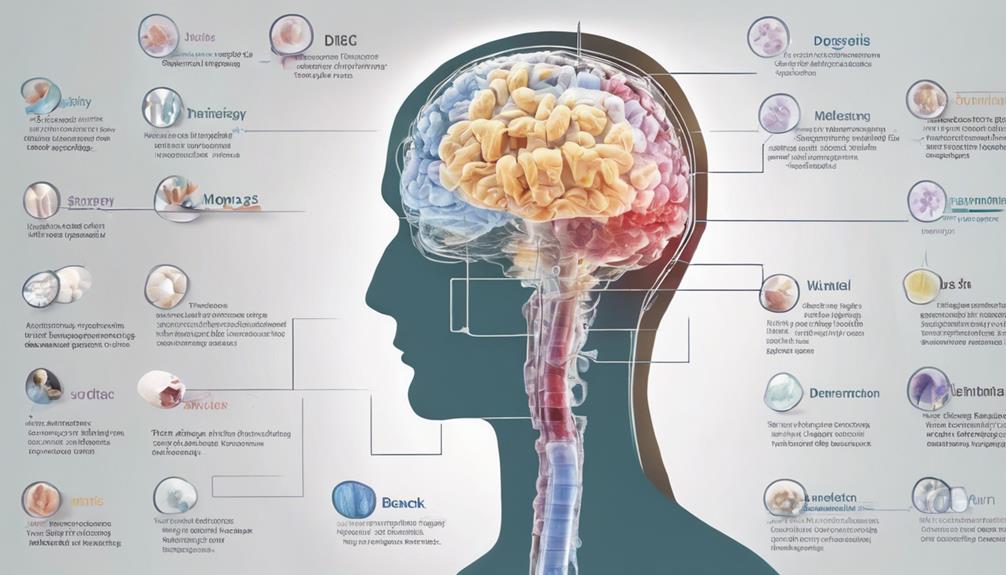Time is often considered crucial, particularly when dealing with the complex challenges of Rapidly Progressive Dementia (RPD). This highlights the pressing need to comprehend its intricate characteristics.
The intricate interplay of various causes and the nuanced presentation of symptoms paints a challenging landscape for clinicians and caregivers alike. Yet, within this intricate puzzle lies a crucial key that, once discovered, can unlock paths to tailored treatments and improved quality of life.
The journey through RPD's maze is not a solitary one; it is a collaborative effort where every step counts towards unraveling its mysteries and providing hope for those affected.
Key Takeaways
- RPD symptoms include cognitive decline, memory loss, motor issues, and mood swings.
- Specialist consultation, diagnostic tests, and brain imaging aid in RPD diagnosis.
- Tailored treatment, medications, and palliative care are crucial for RPD management.
- Early intervention, supportive care, and end-of-life discussions enhance RPD outcomes.
Causes of Rapidly Progressive Dementia
Rapidly progressive dementia arises from a myriad of complex neurodegenerative, autoimmune, infectious, and neoplastic etiologies. Prion diseases, such as Jakob-Creutzfeldt disease, stand out as rare yet devastating causes. Atypical neurodegenerative disorders, autoimmune encephalopathies, and infections also play significant roles.
In the realm of nonprion rapidly progressive dementias, nonprion neurodegenerative diseases, autoimmune conditions, and leukoencephalopathies are key contributors. When considering adult-onset causes, Alzheimer's disease, frontotemporal dementia, and Lewy body dementia are major players. Interestingly, autoimmune encephalitis has emerged as a noteworthy culprit in this context.
Recent investigations have even pointed towards dural arterial venous fistulas as potential triggers for rapidly progressive dementias. Understanding the diverse spectrum of conditions that can lead to this debilitating condition is vital for accurate diagnosis and timely intervention. Identifying the underlying cause is paramount for guiding appropriate management strategies and improving patient outcomes.
Symptoms of RPD

Symptoms of rapidly progressive dementia (RPD) manifest as a rapid decline in cognitive function, memory loss, and challenges with language and motor skills. Patients with RPD may experience a range of distressing symptoms that significantly impact their daily lives. Here is a detailed look at the symptoms commonly associated with RPD:
| Symptoms | Description |
|---|---|
| Memory Loss | Patients may struggle with short-term memory, forgetting recent events or important information. |
| Motor Function Issues | Coordination problems, muscle weakness, tremors, and difficulties with movement can be observed. |
| Cognitive Decline | Impaired judgment, confusion, and disorientation are hallmark signs of the progressive brain changes. |
| Mood Swings | Behavioral changes, personality alterations, and sudden mood swings can be challenging for patients. |
Understanding these symptoms is crucial for early detection and intervention in patients with RPD. It is essential to provide support and care that addresses the diverse needs of individuals experiencing these distressing manifestations of the condition.
Diagnosis of RPD
Upon observing distressing symptoms such as memory loss, motor function issues, cognitive decline, and mood swings in a patient, specialist consultation becomes imperative for diagnosing rapidly progressive dementias (RPD).
The diagnosis of RPD involves a comprehensive approach that includes a thorough exploration of the patient's symptoms, family history, and physical examination. Laboratory testing plays a vital role in the diagnostic workup, where blood, urine, and cerebrospinal fluid (CSF) analyses are conducted to identify potential causes of neurodegenerative processes underlying RPD.
Additionally, brain imaging techniques like MRI are essential to detect structural changes in the brain associated with RPD. In some cases, an electroencephalogram (EEG) may reveal abnormal brain wave patterns, such as Periodic Sharp Wave Complexes, further supporting the diagnosis of RPD.
Therefore, a multidisciplinary evaluation encompassing specialist consultations, laboratory investigations, brain imaging, and EEG assessments is crucial for accurately diagnosing rapidly progressive dementias.
Treatment for RPD

Treatment options for rapidly progressive dementias (RPDs) are tailored based on the underlying cause, focusing on improving quality of life and addressing specific symptoms. Medications play a crucial role in managing RPDs, aiming to alleviate symptoms and slow down disease progression where possible. Symptom management is essential to enhance the overall well-being of individuals affected by RPDs, addressing issues such as cognitive decline, behavioral changes, and physical limitations.
Additionally, identifying and treating reversible factors that may contribute to the rapid progression of dementia is vital in optimizing treatment outcomes. For cases where RPDs have no cure, palliative care becomes a primary focus, ensuring comfort and support for both patients and their caregivers. Emphasizing early diagnosis is key in initiating timely interventions that can enhance the quality of life for individuals with RPDs.
Ongoing research into disease-modifying therapies offers hope for future advancements in the treatment of rapidly progressive dementias, encouraging participation in clinical trials to explore potential new treatments.
Management Strategies
Utilizing a combination of pharmacological interventions, symptomatic management approaches, and comprehensive supportive care is essential in the effective management of rapidly progressive dementias (RPDs).
When dealing with RPDs, specific management strategies need to be implemented for optimal care:
- Pharmacological Interventions: Initiation of medications such as cholinesterase inhibitors and memantine can help alleviate cognitive symptoms in patients with RPD, although the degree of effectiveness may vary depending on the underlying cause.
- Supportive Care: Providing holistic care that includes physical, emotional, and social support is crucial in enhancing the quality of life for individuals with RPD. This approach aims to address the multidimensional needs of the patient and their caregivers.
- Clinical Trials: Participation in clinical trials can offer potential access to cutting-edge treatments and interventions that may slow down the progression of RPD or improve symptoms, contributing to advancements in the field.
- End-of-Life Planning and Palliative Care: Considering the unpredictable prognosis of RPD, early discussions about end-of-life preferences and palliative care options are vital to ensure that the patient's wishes are respected and appropriate care is provided.
Frequently Asked Questions
What Causes Dementia to Progress Rapidly?
When dementia progresses rapidly, various factors can contribute to this swift decline. These may include underlying health conditions like infections, metabolic imbalances, or vascular issues affecting the brain.
Additionally, certain neurodegenerative diseases, such as Creutzfeldt-Jakob disease or autoimmune encephalitis, can lead to a quick deterioration in cognitive function.
Understanding these diverse causes is crucial for timely diagnosis and appropriate management of rapidly advancing dementia.
What Is the Life Expectancy of Someone With Rapidly Progressing Dementia?
We understand that discussing life expectancy can be daunting. It's essential to approach this topic with sensitivity and accurate information.
When considering the life expectancy of someone with rapidly progressing dementia, it's vital to remember that various factors can influence outcomes. Seeking timely medical intervention and appropriate care can impact prognosis significantly.
Supportive measures, symptom management, and quality of life considerations are crucial elements in the journey of individuals facing rapidly progressive dementia.
What Are the Symptoms of Rapid Onset Dementia?
When discussing symptoms of rapid onset dementia, it's crucial to consider the various cognitive and behavioral changes that can occur.
Memory loss, confusion, difficulty with daily tasks, personality changes, mood swings, language difficulties, and impaired motor skills are common indicators.
These symptoms can significantly impact both the individual's functionality and the well-being of their caregivers.
Early recognition and evaluation play a crucial role in effectively diagnosing and managing this condition.
Can Dementia Get Worse Suddenly?
Yes, dementia can worsen suddenly, leading to a rapid decline in cognitive function. This decline can be distressing for both the individual and their caregivers.
It's essential to monitor changes in symptoms closely and seek medical advice promptly to explore potential causes and appropriate management strategies.
Timely intervention and support are crucial in addressing sudden worsening of dementia to ensure the well-being of those affected.
Conclusion
In conclusion, rapidly progressive dementia is a complex and challenging condition that requires prompt diagnosis and tailored treatment strategies.
By understanding the diverse causes, recognizing the varied symptoms, and implementing effective management plans, we can strive to improve the quality of life for individuals affected by RPD.
Through a multidisciplinary approach and ongoing research efforts, we aim to continue advancing our knowledge and capabilities in addressing this rapidly evolving neurological disorder.
Let's work together towards better outcomes for those impacted by RPD.









